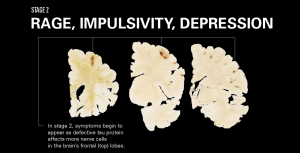Football has long since been recognized as a dangerous sport, but for long, and for most, this view was held in reaction to frequent sprained ankles and torn ACLs. In recent years, however, awareness surrounding the dangers of football-related head trauma have come to the forefront. Concussion protocol in professional sports has increased. Players are treated with extra caution when displaying concussion like symptoms, and coaches are advised not to put their players back in the game because the dangers of concussions are known.
As dangerous as concussions are, the ultimate result of repeated head trauma can be even more devastating. CTE, (chronic traumatic encephalopathy) is a progressive, degenerative brain disease heavily correlated to football-related head trauma.
While scientists have found a correlation between football and this disease, we know that correlation does not always equal causality. Scientists have, however, developed a plausible mechanism for the development of the brain disease. Nadia Kounang draws a parallel between the brain inside of  the skull and an egg inside of a shell to illustrate how the disease is contracted from sub-concussive impact. The brain is suspended in fluid inside your skull, much like the yolk of an egg that sits within the whites of the egg. When severe impact is made, the brain sloshes back and forth within the fluid. This repeated movement is damaging for the brain and leads to the development of CTE (Kounang). Furthermore, Kounang notes that harder helmets or more padding cannot prevent the brain from being damaged. For example, putting a dozen eggs in a carton may prevent them a bit from breaking, but cannot stop the yolk from moving back and forth within the shell (Kounang).
the skull and an egg inside of a shell to illustrate how the disease is contracted from sub-concussive impact. The brain is suspended in fluid inside your skull, much like the yolk of an egg that sits within the whites of the egg. When severe impact is made, the brain sloshes back and forth within the fluid. This repeated movement is damaging for the brain and leads to the development of CTE (Kounang). Furthermore, Kounang notes that harder helmets or more padding cannot prevent the brain from being damaged. For example, putting a dozen eggs in a carton may prevent them a bit from breaking, but cannot stop the yolk from moving back and forth within the shell (Kounang).
After reading this one source, I tried to find a more definitive answer as to how CTE is developed, as the first only provided the analogy between brain and egg. I wondered if a confounding variable could be at work. For example, could CTE be due not necessarily to the being hit in the head but perhaps wearing helmets that are tight on the skull. mayoclinic.org, though, notes that players of all sports are at risk. The back and forth movement of the brain causes a protein called tau to build up surrounding the blood vessels, which deteriorates brain functioning and damages nerve cells, a main symptom of CTE (Wexler). By the end of CTE’s development, the state of the brain is fully altered from its original state.
The tau buildup in the brain of a CTE patient mirrors that of an Alzheimer’s patient; football is the fast track to Alzheimer’s related symptoms. While the repeated head trauma does ultimately cause CTE, the tau buildup is an intermediary. This is to say that repeated blows to the head cause the tau protein in our brains to clump together and clout, which advances the symptoms of CTE.
The next issue is dealing with how to recognize CTE in a living brain. Up to now, recognition of tau build up in CTE-diagnosed brains only happened after the player had died. Tau is in all human brains. It is the deposits and clots of tau that are extremely dangerous, the hard endpoint.
In order to judge how much head trauma affects tau buildup in the brain, scientists studied the brains of five retired NFL players and five control brains. The brains of the NFL retirees had much higher levels of tau deposits in their brain. The deposits were mostly found in the amygdala, a part of the brain that dictates fear and anger (Roth), which corresponds with the second stage of CTE, as pictured above (Wexler).
While this is a very small study, paired with the standing belief that tau deposits could cause CTE, I think it is very promising. I would like to see a much larger control study in which the brains of retired NFL players are compared to control brains of say, white collar workers. This could lead to concluding that it is too unlikely for chance to be at work. As such, it could be confirmed through a large control study that head trauma causes tau deposits, and tau deposits cause CTE.
Identifying the link between tau deposits and CTE is crucial, because scientists believe they have found a correctional method by which they can prevent the loss of tau’s function in the brain (Roth). With deaths of football retirees increasing, a study such as this that finds correctional means may be able to silence the rising sentiment that football is too dangerous to play.
Pictures from:
http://study.com/academy/lesson/cerebrospinal-fluid-in-the-brain-functions-production.html



This is really a topic that is constantly being discussed and at the same time one that will probably never end because of the danger that football provides. Everything kid, teenager, and adult knows what they are signing up for when they are playing one of the most dangerous sports. There are the possibilities of life threatening injures, but at the same there are the same risk of other jobs. I know there has been a lot of discussion about how players in the NFL aren’t being protected correctly, or simply they aren’t cared about. But a lot of the blame can’t be put on them because they are always trying to improve the safety of the helmets, always coming up with new advances in the design that has a better chance of better protection. In addition, a lot of the helmet to helmet plays happen incidentally, something that can’t be prevented because thats simply the nature of the game. If you look at the tackle that paralyzed Eric LeGrand, there wasn’t anything malicious about it, just a simple football play that happened to go wrong. A lot of these former NFL players are beginning to sue the league because they are suffering from these post career injuries, but going into it they knew the risk that was being taken.
Attached is a link about how the NFL is finally acknowledging that there is a link between football and CTE: http://www.espn.com/espn/otl/story/_/id/14972296/top-nfl-official-acknowledges-link-football-related-head-trauma-cte-first
This has been a discussion for many years, so the awareness has been publicized. The athletes who decide to play football realize what they’re getting themselves into and the risks they face. Now you are starting to see players start playing much later, like in high school because the parents of those players realize their son is still young and their brains are still developing at that young age and they don’t want permanent damage at such a young age. No matter how much you try and “scare” someone into not playing football, someone with a true passion for the game will never back down. If someones son decides that they want to join the army and they have a burning passion in them to be a solider nothing anyone says is going to stop them, not even the fear of dying. The same thing goes for someone with a passion to play football, someone may tell them they are at high risk of serious and sometimes career ending injury, but that’s not going to stop them from playing no matter what, NFL players are born to be NFL because less than 1% of the people who play football make it to that level. The other thing is the football can’t become extinct because the NFL is one of the wealthiest, money-making markets in the country, just imagine how much differently this country would change without football, it would affect more than you think.
I agree that it would be interesting to compare the brain of a retired NFL player player to that of an older male who did not play professional football. I also started to wonder if football players who are not professional such as high school players are at the same risk for brain damage. I came across this article: http://www.pbs.org/wgbh/frontline/article/high-school-football-players-face-bigger-concussion-risk/.
It claims that a high school player could be up to twice as likely to get a concussion than a college player, leading to potential future symptoms of brain damage.
I think it is interesting that you have focused in on football for this argument, but I would like to add that I have seen concussions in many other sports. For example, my brother got a concussion in wrestling from being slammed on his head, I have received concussions in basketball and soccer, and I have witnessed several others in cheerleading. I know that football contact can be much rougher and players are more likely to get an injury, but if they eliminate football, wouldn’t they have to eliminate all sports with potential risks for concussions? I think this topic is completely relevant to the controversies surrounding concussions today, but perhaps they could just encourage better head protection in all sports instead of getting rid of them in general. After all, sports promote a ton of media, especially at the college level and this could then lead to the media losing a lot of profit. I came across an article dealing with the NFL and money that the organization makes as well as makes for the media that may interest you. Banning football could not only bring an uproar of fans, but it could also bring a huge conflict with the media corporations. LINK
I find it difficult that football (or any contact sport for that matter) will become extinct solely because of evidence that it may be harmful in some way. Tobacco has been used for centuries and still is today even though it is extremely detrimental, and red meat has been found to contain carcinogenic substances, but very few people will let that make them stop eating it. I feel it is safe to say that the slogan of SC 200 is “human intuition is lousy”, and this is a perfect example of that.
People are stubborn and prefer direct experience to statistics, which means test results may influence their habits, but will very rarely compel change. It is very difficult for outside sources to influence human psychology enough to make a person stop doing things the way they always have. Humans innately resist change, especially drastic ones; unfortunately, as beneficial as it would be, it’s hard to believe football is going away too soon.
I really like the comparison here between football and smoking; everyone knows that it is damaging but it is hard to believe that either will cease to exist. The title of this post was based off of a sports game I played where the premise was that football had been banned because of how unsafe it is. However, with football being the multi-million dollar industry that it is, it is surely hard to believe that randomized control trials or research can make a difference